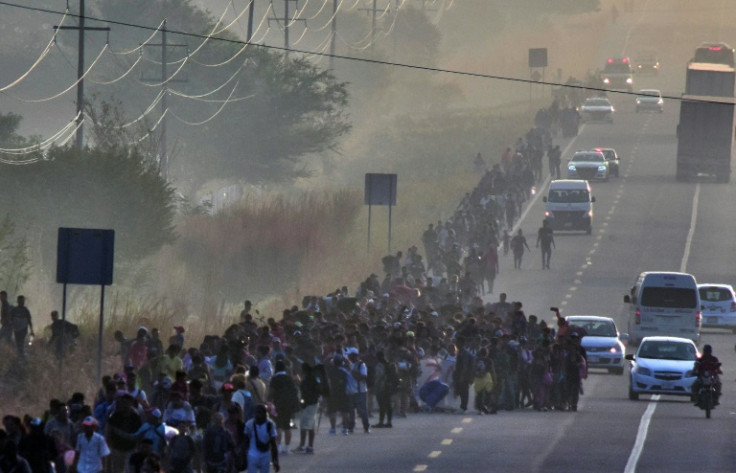
SEATTLE - Anticipating stricter rules and heightened enforcement measures around the U.S.-Mexico border, migrants from all over Latin America continue to set their sights on reaching the United States before Donald Trump's January 20 inauguration.
His anti-immigrant rhetoric and his promises of carrying out the largest mass deportation operation in American history have instilled fear in the minds of thousands of migrants in Central and South America, prompting them to make their journey up north in masses.
According to the latest reports from Mexican authorities and activists, more than 2,000 migrants have formed a new caravan in the city of Tapachula, in southern Mexico, aiming to reach the U.S. before Trump takes office next month.
EFE reported that the group assembled on Dec. 1 to review their plan of action and to define the stages in which they will conduct the dangerous journey through Mexico. The latest caravan congregating in Tapachula is composed mostly of migrants from Venezuela, Cuba, Ecuador, Nicaragua, Dominican Republic, Colombia and from other Central American countries.
Concretely, the migrant caravan agreed to meet at Tapachula's Bicentenario Park on Dec. 1 to facilitate their departure towards Mexico City the following day. According to a Venezuelan migrant, they decided to form a caravan since they cannot leave Tapachula by bus and job opportunities are scarce as they await their asylum appointment on the CBP One app.
"We are leaving on foot on Dec. 2. We ask the U.S. government that they open their doors to us, we are coming to work, no matter who the president is," the Venezuelan migrant added.
Similarly, a migrant from Ecuador told EFE that, in the last few days, more and more people have decided to leave Tapachula due a number of reasons, including insecurity, a lack of housing for migrants and job scarcity in the southern Chiapas community.
"I am going to be honest, we cannot trust them," he said. "We have been witnesses of agents that said they were going to help but ended up lying...they arrest you for three days and they do not help you with getting the document you need. That is why we do not trust anyone, we are going only with God's help," he added.
Mexican authorities dismantled the caravans during the weekend. Some were bussed back to southern Mexico while others were offered documents to cross the country.
Migrant caravans heading to the U.S.-Mexico border
This is not the first and won't be the last time migrant caravans decide to risk their lives and make their way towards the United States' southern border.
According to EFE, a caravan that left the city of Tapachula on Nov. 20 has been reported to have reached the municipality of Arriaga, Chiapas, a little over 150 miles northwest of the border with Guatemala.
Between January and August of this year, Mexico recorded the presence of at least 925,085 migrants, a rise of more than 130% compared to the nearly 400,000 migrants that were reported inside Mexico in 2023.
Hurdles faced by migrants
As Trump and Mexican President Claudia Sheinbaum agreed to curb the flow of migrants reaching the United States, officials in Mexico have started to dismantle the so-called caravans headed northbound.
According to El Universal, Mexico's National Immigration Institute took apart the 2,000-strong group that had reached the city of Tonalá after starting its journey in the same city of Tapachula on Nov. 20.
Agents arrived on Nov. 30 to Tonalá and offered migrants the Multiple Migratory Form, a document that allows them to legally stay in Mexico for 20 days.
According to Irineo Mujica, a local activist and director of the organization Pueblos Sin Frontera (PSF) said the latest measures taken by Mexico are in response to Trump's pressure on its southern neighbor to put an end to illegal immigration.
Luis Rey García Villagrán, another migrant-rights activist, said that the document handed out by agents is a "trap".
"If migrants are seen walking is because they do not have money, and without money, where are they going to land in 20 days?," Villagrán said. "The form they received has a a 180-day validity but they only received a 20-day grace period, what are they going to do in just 20 days," he added.
© 2025 Latin Times. All rights reserved. Do not reproduce without permission.








